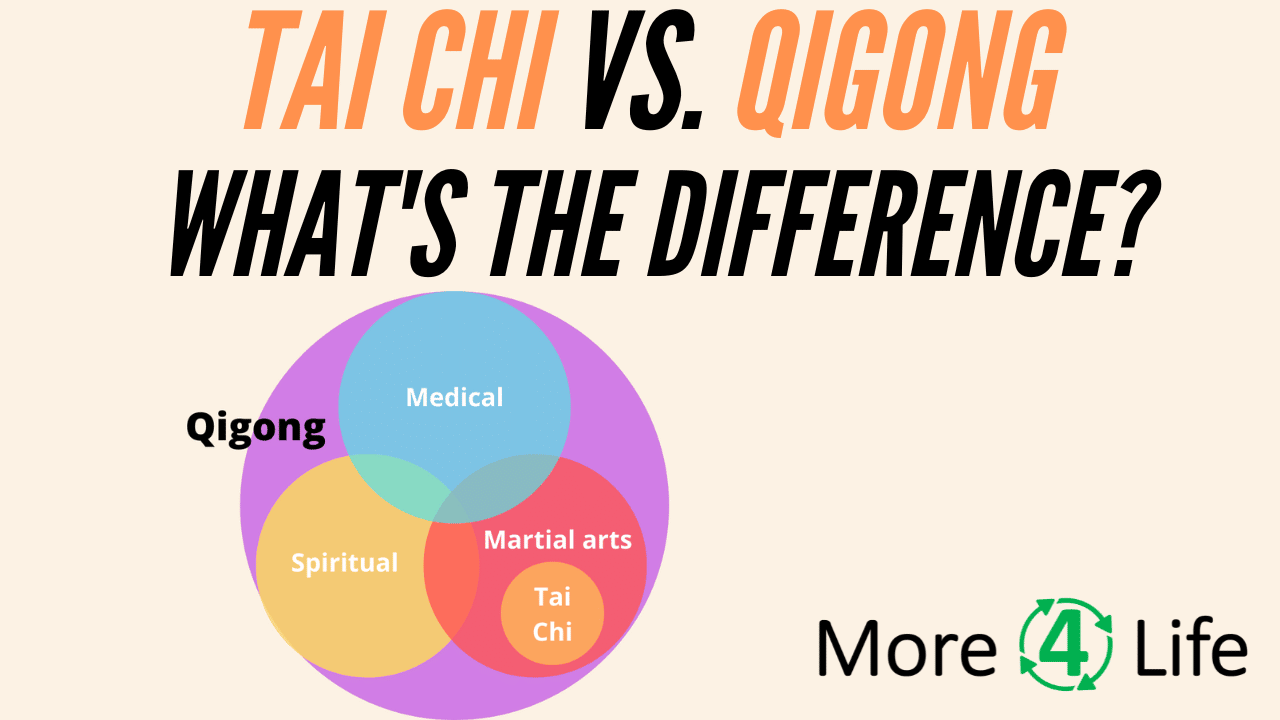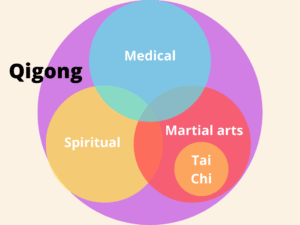In recent years, Tai Chi and Qigong have gained increased popularity worldwide. In the United States, Tai Chi is more widely known and practiced. Of people who have heard of Qigong, many don't know the difference between Tai Chi vs. Qigong, or which one has better health benefits.
That is the question that I'll answer in this post:
Tai Chi vs. Qigong: What's The Difference?
What is Tai Chi & What Are The Benefits?
What Is Tai Chi?
Tai Chi is a form of exercise that has been practiced in China for hundreds of years. It is considered to be a method of moving meditation, as it helps practitioners focus on the present moment and clear their minds.
Tai chi was involves slow and gentle movements, which are aimed to improve the flow of qi (energy) throughout the body.
Tai chi can also be used for self-defense, but it does not require any physical contact with the attacker.
Origins of Tai Chi
Tai chi is an ancient Chinese martial art with origins between 700 to 1500 years ago. Tai chi actually originated as a branch of Qigong, which has origins going back 3,000 to 5,000 years.
What Are The Health Benefits Of Tai Chi?
There are many health benefits that come with practicing tai chi.
Some of the benefits of tai chi include:
-
improving posture
-
increasing energy level
-
reducing stress and anxiety
-
lowering blood pressure and cholesterol levels.
-
improved flexibility
-
better balance
-
reduced muscle tension
What Is Qigong & What Are The Benefits?
What is Qigong?
Like Tai Chi, Qigong is also an ancient Chinese exercise that is believed to improve health and wellness.
As mentioned above, it was originated well before Tai Chi, as far back as 5000 years. Even to this day, Tai Chi still remains a subset of Qigong.
Qigong is divided into 3 main types:
2. Spiritual Qigong
3. Martial Arts Qigong
Within the martial arts type of Qigong lies Tai Chi.
In other words, all Tai Chi is Qigong, but not all Qigong is Tai Chi.
How Is Qigong Practiced?
Qigong combines deep breathing with specific movements repeated several times with intent towards either and emotion or a part of the body
Qigong is also known as “chi kung”, which translates to “life energy cultivation”. With qi meaning "life energy" or "vital energy" and gong meaning "a skill cultivated through practice."
The movements of qigong are believed to balance the flow of qi (chi) through the body's meridians or channels, similar to acupuncture.
Traditional Qigong theory holds that when qi is either flows too quickly, too slowly, or not at all, healthy is negatively affected.
What are The Health Benefits Of Qigong?
Large, the health benefits of Qigong are largely the same as the benefits of Tai Chi.
Qigong combines meditation with gentle movements to relax the mind while increasing circulation. This in turn can help to heal various ailments or diseases, as well as improve your overall health.
There are many health benefits to practicing qigong, including:
-
Improved circulation
-
A stronger immune system
-
A more relaxed state of mind
-
Better posture
-
Increased flexibility
-
Decreased pain
-
Improved mental health
As you can see Tai Chi and Qigong have quite a bit in common!
So that begs the question:
Tai Chi vs. Qigong: What’s The Difference?
Although Tai Chi and Qigong have common origins and benefits, they differ in their approach and how they are practiced
Qigong is a practice that uses gentle exercise to promote relaxation and well-being. It involves slow, deliberate movements that are repeated rhythmically, usually with the intent of improving either a certain body organ, body system, or an emotion.
Tai Chi, on the other hand, emphasizes mindful movement for balance, strength, and fluidity of the body. Tai Chi is performed using slow, flowing manner, often involving intricate forms that string various moves together.
This makes Tai Chi more of a general practice. While Qigong can be used for a number of different reasons, the intent of a single Qigong session is usually more specific around a certain goal.
Tai Chi vs. Qigong: Which One Is Better For Beginners?
Both Tai Chi and Qigong can be adapted to people of all fitness levels, even people who need to sit in a chair. You don't have to be in great shape to begin practicing Qigong or Tai Chi.
As noted above, Tai Chi strings together series of single movements into flowing forms. Learning these forms requires discipline and practice. For that reason, Tai chi may be more difficult to learn for a beginner.
Qigong, on the other hand, can be practiced by anyone at any time as it usually focuses on one movement at a time in a stationary posture. Therefore, qigong may be better for beginners.
Want To Get Started With Qigong?
Tap the button below to learn about our Qigong classes


